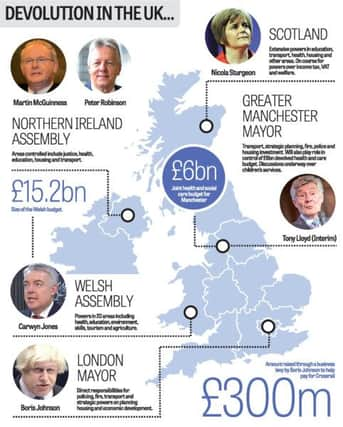Big Debate: Yorkshire at a crossroads over its devolution ambitions


They were smiles of relief worn by council leaders who had just emerged from a meeting with then Deputy Prime Minister Nick Clegg which had gone better than any had of them had hoped.
Weeks earlier, Chancellor George Osborne had announced a ground-breaking agreement that would see the Greater Manchester group of councils take over key powers and spending in areas including transport, planning and economic development from Whitehall.
Advertisement
Hide AdAdvertisement
Hide AdCrucially, as part of the deal, it had been agreed Greater Manchester would have an elected so-called metro-mayor covering City of Manchester and its nine neighbours.
This was a huge step forward for George Osborne’s ‘northern powerhouse’ vision as it showed a Conservative Chancellor could do deals with a Labour dominated North.
The reverberations were felt in Yorkshire. Outright opponents of elected mayors were forced to consider whether they were willing to swallow their pride to accept a deal on the same terms.
Even those open-minded to the concept were left wondering how on earth they could sell the idea to voters who in referendums just two years earlier had rejected plans for elected mayors for Wakefield, Bradford, Sheffield and Leeds.
Advertisement
Hide AdAdvertisement
Hide AdAnd if they waited until after the General Election, would Labour offer a more palatable alternative?
Mr Clegg appeared to come to their rescue.
He had launched his own Northern Futures initiative, his own attempt to shape the devolution debate, and a summit was arranged to take place in Leeds in November to bring all the major players together.
It was an opportunity for Yorkshire’s council leaders to get answers. And they were pleasantly surprised by what they heard.
The Deputy Prime Minister reassured them there would be no requirement to have elected mayors as a condition of devolution.
Advertisement
Hide AdAdvertisement
Hide AdIn case there was any doubt, the Deputy Prime Minister later repeated his reassurances to journalists at the event saying: “I have always been very very clear that I don’t want and I will not allow as Deputy Prime Minister for any part of Whithall to impose a strait jacket on how areas decide to govern themselves.
“It is not for Whitehall to start pointing a big long finger and dictating to areas how they govern themselves.”
To cap it off. he then took to the stage in the main room to tell delegates he hoped to have deals for the areas known as the Leeds and Sheffield City Regions in place by the Autumn Statement that December.
But as was so often the case when dealing with a Coalition government, it proved not to be that simple.
Advertisement
Hide AdAdvertisement
Hide AdThe subsequent proposals for devolution deals for the Leeds and Sheffield City Regions became a tug of war between Messrs Clegg and Osborne.
Driven by a genuine passion for devolution and the desire to show he could deliver for Yorkshire, where he is an MP, Mr Clegg pushed hard for deals to be agreed.
But Mr Osborne was unwilling to set a precedent of doing Manchester-style deals without Manchester-style mayors.
Such was the deadlock that those negotiating the Leeds City Region deal found at one point they could not get any kind of feedback, positive or negative, on the proposals they were putting into the Whitehall machine.
Advertisement
Hide AdAdvertisement
Hide AdAgreements were announced that December for the Sheffield City Region and in March for its West Yorkshire neighbour. Both contained concrete measures that moved devolution forward, but neither were the blockbuster agreements envisaged.
The General Election would decide where next for this tortuous process.
The wording of the Conservative Party election manifesto was unambigious.
“We will devolve far-reaching powers over economic development, transport and social care to large cities which choose to have elected mayors,” it said.
Advertisement
Hide AdAdvertisement
Hide AdAnd in case there was any doubt, Mr Osborne returned to Manchester to give his first speech since the Conservatives were returned to office with their own majority.
“We will hand power from the centre to cities to give you greater control over your local transport, housing, skills and healthcare. And we’ll give the levers you need to grow your local economy and make sure local people keep the rewards,” he said.
“But it’s right people have a single point of accountability: someone they elect, who takes the decisions and carries the can.
“So with these new powers for cities must come new city-wide elected mayors who work with local councils.
Advertisement
Hide AdAdvertisement
Hide Ad“I will not impose this model on anyone. But nor will I settle for less.”
Assuming Yorkshire wants to take more control over its own affairs before the next General Election, the debate over whether the region has an elected mayor or not is over. The question is now how many, and covering what areas?
As part of earlier devolution agreements with Government , considerable work has already gone in to economic plans based on the Leeds and Sheffield City Regions, North Yorkshire and the Humber and there is considerable momentum behind efforts to establish mayors on similar lines.
But there are concerns from others that Yorkshire may be in danger of trading away its biggest asset, its identity, and that the devolution from Mr Osborne is an opportunity to unite the region.
READ MORE...